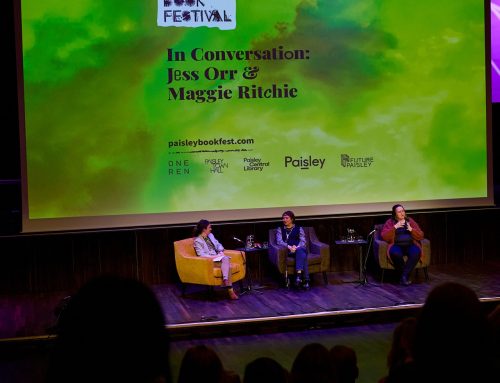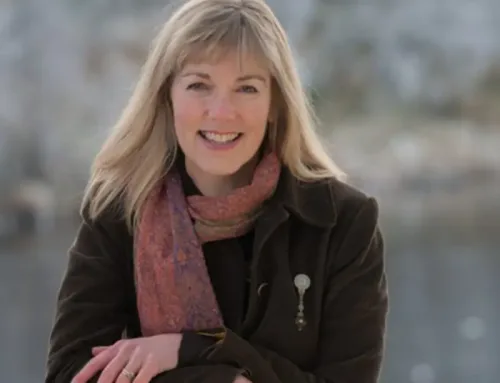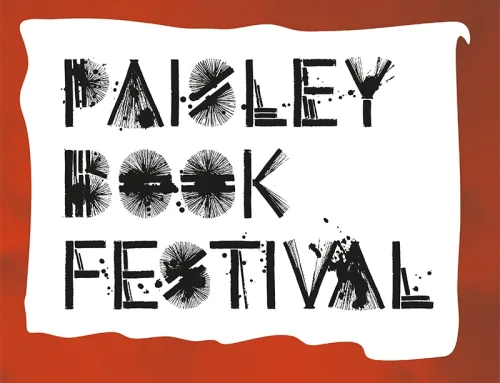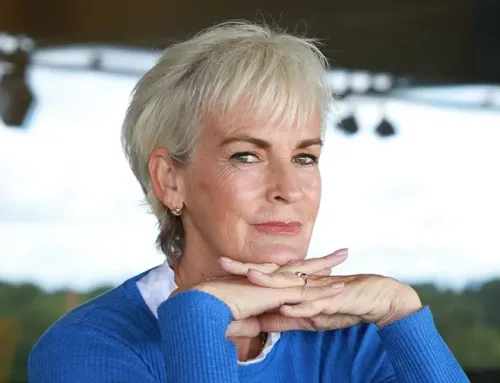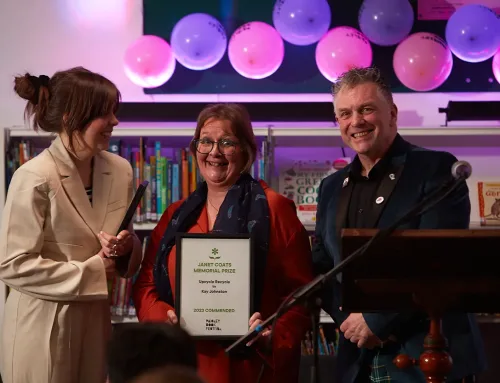The Paisley Book Festival 2024 kicked off with Poets in Paisley presents An Evening with Nutmeg, Scottish football’s finest print magazine. For this event, organised by festival regular and poetry trailblazer Donna Matthew, the magazine’s editor, Daniel Grey interviewed footballing legend Rose Reilly, and founder of the Scotland Crime Writers’ football team, Craig Robertson. Nutmeg is, as Daniel points out, the only football magazine with its own dedicated poetry section.
The event was brought to life by Stephen Watt, the magazine’s poetry editor and award-winning spoken word artist. His first poem, Football is Poetry, sets the scene for an evening in which the highs and lows, the expectations and disappointments, personal achievements and intersectional disadvantages are brought together through our love of the Beautiful Game in Scotland.
While Stephen’s poetry (and later Julie’s) called-out and challenged the toxic masculinity that all too often hampers our enjoyment of the matchday experience, Rose Reilly was matter of fact about the brutal oppression she experienced growing up in the 1960s as a woman who wanted nothing more than to play football. In an era when sexism and misogyny were more normalised than today, this is a remarkable tale of resilience and determination.
As a young child, Rose had her hair cropped short and became Ross in order to participate in a sport in which girls were universally excluded. She talked about a game where, as a kid, she ran riot and scored eight goals. A Celtic scout was watching and told the manager this was the player he wanted to sign. ‘Not possible’, said the manager. ‘That’s a wee lassie’. The scout was stunned. Rose knew then that, socially constructed gender barriers aside, she was good enough to play for the club she loved and supported all her life. She also told of a time when her attempts to get into the Stewarton Thistle Ladies team were almost thwarted by their inability to grasp the fact that, given her skill and proficiency at scoring goals, she wasn’t a boy. In her predicament, Rose said, gender trouble was an ever-present fact of life.
Rose was expelled from school for her refusal to give up football. Forced to take a job in manufacturing, Rose was sacked from her job in a carpet factory when management found out she had played football for a rival company. Due to her tenacious determination, Rose overcame these hurdles. She sought the only routes available and moved to France where, after a stunning season, she was then bought, without her knowledge or consent, by AC Milan. This fabulous story ends in Rose becoming, easily, Scotland’s most successful footballer of all time. Winning Serie A on numerous occasions as well as Italy’s player of the year, and then captaining an Italian national side that won the Women’s World Cup in 1984, it is clear that she achieved more than any of her male counterparts.
Such is the sheer romanticism of this story; Maureen Carr performed in and directed a play about Rose’s life. It came as no surprise to the audience when Rose informed us that a film is now in the pipeline. When Daniel Grey asked who should play the role, she said she hoped it would be given to someone who could both act and who was also a footballer. Rose is still very active in her support for women’s football in Scotland, which she said is savagely underfunded compared to other nations. Her awareness of the intersectional and entangled nature of all forms of oppression became evident when she spoke about sporting rivalry. Scotland and England were fierce opponents, but in the women’s game there was an unusual sense of sisterhood, since a shared awareness of the disadvantages women faced in the game provided a sense of solidarity. “After all”, she said, “we women need to stick together’.
Daniel’s other stage guest was bestselling crime writer, one-time player and one of the game’s most eloquent aficionados, Craig Robertson. His passion and knowledge of the game shines through his effortlessly told tales of self-deprecating wisdom. Having played the game, Craig bemoaned the fact that throughout his brief career he suffered a relentless prejudice from coaches, all of whom had something against players which they believed had with no discernible ability or talent.
Amazing, bizarre and interesting facts emerge from this discussion, which even Robertson’s biggest fans might not know. There are, in no particular order of merit, five such curiosities:
- His cousin is none other than footballing legend John Robertson. Craig was there, in Munich when Nottingham Forrest won the European Cup by beating Malmo of Sweden 1 – 0. He saw, with his very own eyes, Trevor Francis head home Robbo’s sublime cross.
- His literary protagonist, DI Rachel Narey, is named after the Dundee Utd and Scotland defender David Narey.
- His mum’s curtains are in the Scottish Football Museum in Hampden. En route to an international tie, his brother removed the massive saltire from the Bannockburn flagpole to accompany the Tartan Army on their adventures in France. In its place, he fixed his mum’s old curtains with the words, “Gone to France” written on them. The beer-stained saltire was duly replaced upon their return. Some years later, the SFA requested that the curtains be sent to the museum, for the sake of historical provenance.
- Crime writer Roberston, not his cousin, scored the last goal ever at Annfield Stadium. Not the home of Liverpool (Anfield), rather, the old stomping ground of Stirling Albion who he played for and scored in the last match before the club relocated to Forthbank.
- Craig Robertson plays for both the Scottish Crime Writers football team as well as the Scottish Writers football team. He played in a difficult match against Italy’s own writers’ team, in the town of Barga, where half the team were former professional players and the other half had family members who owned chip shops in Glasgow.
As Rose and Craig effortlessly passed stories between them like Barcelona’s midfield, the real stars of the show were the guest poets, invited to add literary panache to the proceedings. Julie McNeill’s new book, which she clutched in her hand for the first time, took its rightful place at the front table of the festival book shop. We were treated to a gallimaufry of football-themed tales charting, poetically, the experiences of so many avid fans of the Scottish game. Julie’s literary accounts were the perfect accompaniment to the tales of gendered oppression that Rose suffered in a hostile environment in her pursuit of a football career.
After Daniel sought to elucidate yet more tales of footballing derring-do from his stage guests, it was time for more poetry. The event was concluded by Paisley’s Graham Fulton who, with some 28 poetry books to his name, is widely regarded as something of a grand master in the genre. Differing from the two other poetic voices, Graham took the opportunity to openly disclose the fact that almost all of his football-related tales are set in pubs (in Paisley). If Julie and Stephen’s more recent tales embodied the oscillating reality of the hope and disappointment cycle familiar to supporters of the Scottish national team, Graham’s best works, written before our recent renaissance, are steeped in the despair of a lost future that seemed to last for an eternity.
Paisley Poets Presents An evening with Nutmeg cannot come to pass without mention of the event’s organiser. Donna Matthew has not only embraced the Paisley Book Festival as a regular performer, she has also transcended the possibilities such an event can offer in ways that should inspire all budding poets. Festival regulars might miss Donna’s spoken word performances this year, but the fact that her new poetry collection Remembering Myself is going to print, means a much-anticipated Paisley launch event. What can be said for sure is that with her Paisley Poets Presents event, the Paisley Book Festival got off to a tumultuous start.



